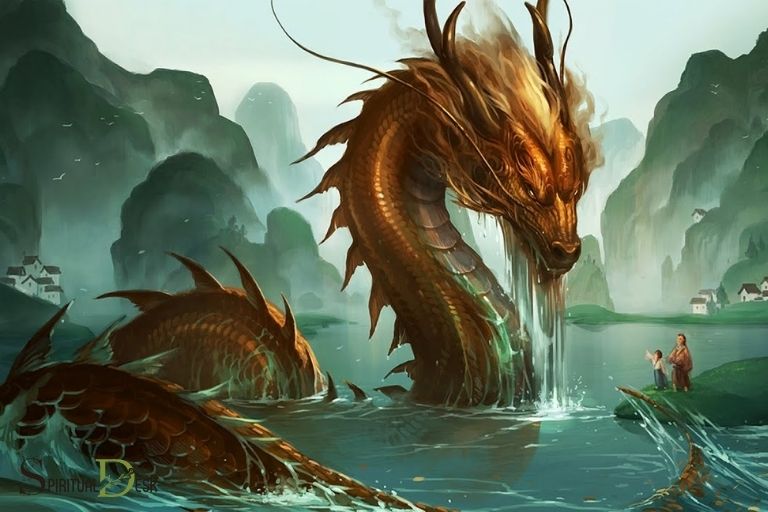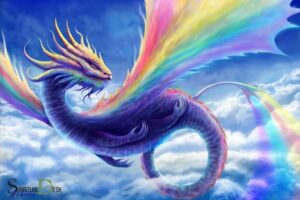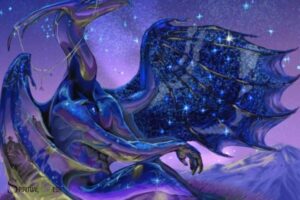Chinese Dragon Spiritual Meaning: Wisdom!
The Chinese dragon symbolizes power, strength, wisdom, and good fortune. Its spiritual meaning portrays the balance between heaven and earth, as well as the embodiment of the concept of yang, representing positive energy.
Step into the world of Chinese mythology as we unravel the spiritual significance of the mighty Chinese dragon. Discover how this mystical creature has been an integral part of the Chinese culture for centuries.
In Chinese culture, the dragon is revered as a potent symbol of auspiciousness and divine protection.
Embracing its spiritual essence allows people to harness the power of the universe, promoting balance and prosperity in all aspects of life.
7 Aspects: Spiritual Meaning of Chinese Dragon
| Aspect | Spiritual Meaning |
|---|---|
| Symbolism | Power, strength, good luck, prosperity, and auspiciousness |
| Elements | Earth, Fire, Water, and Wind |
| Colors | Red (happiness), Yellow (royalty), and Blue (benevolence) |
| Number of claws | Five claws (Imperial dragon), Four claws (Noble dragon), Three claws (Ordinary dragon) |
| Associated gods | Dragon King (god of water and weather), Jade Emperor (supreme deity of Chinese mythology) |
| Yin and Yang | Balancing the forces of nature, representing harmony and the cycle of life |
| Cultural events | Chinese New Year, Dragon Boat Festival |
Key Takeaway

Five Facts About: Spiritual Meaning of Chinese Dragon
What is the Spiritual Meaning of the Chinese Dragon?
The Chinese dragon holds significant spiritual symbolism in Chinese culture, and it represents wisdom, power, and benevolence.
These mythical creatures have a deep connection to various aspects of Chinese society, such as Confucianism, Daoism, and folklore.
They embody the concept of “yang,” the positive life force, and they are associated with natural elements like water, rain, and fertility.
- Connection to Chinese history and mythology
- Symbol of divine power and authority
- Protector of people and bringer of good fortune
- Represents the Emperor and imperial lineage
- Associated with water, fertility, and agriculture
The Chinese Dragon Dance is performed during the Lunar New Year and other traditional festivals to bring good luck and drive away evil spirits. It is a vibrant and lively display of the dragon’s spiritual significance in Chinese culture.
spiritualdesk
What Are the Characteristics of the Chinese Dragon in Mythology?
The Chinese dragon is a legendary creature in Chinese mythology, embodying wisdom, power, and auspiciousness.
Often associated with water, it is considered the bringer of rain and the guardian of various bodies of water.
The Chinese dragon possesses unique characteristics that make it distinct from its Western counterparts.
- Serpentine body: Unlike the Western dragon, the Chinese dragon has a long, snake-like body that allows it to move gracefully and adapt to various environments.
- Four limbs: The dragon has a pair of front and rear legs with sharp claws that symbolize its power and strength.
- Horns and whiskers: The dragon’s face features horns and whiskers that represent wisdom and authority.
- Scales: Its body is covered with protective scales, much like a fish or a snake, making it resilient and strong.
- Pearl: A pearl is often depicted with the Chinese dragon, symbolizing its connection to the spiritual realm and its role as a keeper of wisdom and knowledge.
- Divine power: The Chinese dragon is considered a divine creature, capable of bringing good fortune, prosperity, and protection to those it favors.
How Can One Apply the Spiritual Meaning of the Chinese Dragon in Their Daily Life?
The spiritual meaning of the Chinese dragon is deeply rooted in Chinese culture and represents wisdom, power, and strength.
By understanding this symbolism, one can apply the ancient wisdom in their daily lives, fostering inner growth and promoting harmony.
- Embrace inner strength: Just as the dragon embodies power, learn to face challenges head-on and never back down.
- Pursue wisdom: Seek knowledge and understanding in every aspect of life, and incorporate the lessons learned in your daily practices.
- Cultivate adaptability: The Chinese dragon is known for its flexibility; adapt to change and grow with every experience.
- Promote balance: Foster harmony within yourself and with others by maintaining a balance between the elements of life, such as work and relaxation, and assertiveness and empathy.
- Exude confidence: Channel the dragon’s boldness in your actions and decisions, while remaining humble and open to growth.
By embodying the spiritual meaning of the Chinese dragon, one can lead a fulfilling and balanced life that embraces wisdom, strength, and adaptability.
FAQ of Chinese Dragon Spiritual Meaning
What is the spiritual meaning of the Chinese dragon?
The Chinese dragon is seen as a symbol of power, strength, and luck in Chinese culture, and represents protection, success, and good fortune.
It is seen as a representation of strong, positive energy capable of bestowing power and prosperity on those who respect it and seek its guidance.
How is the Chinese dragon usually depicted?
The Chinese dragon is usually depicted as a long, scaled serpent-like creature with four legs, an expansive wingspan, and long whiskers.
It is often seen with a pearl, which is thought to grant wishes to those who possess it.
What elements are associated with the Chinese dragon?
The elements associated with the Chinese dragon are wood, earth, water, fire, and metal.
Furthermore, the five elements each represent a different direction and represent the harmony between the yin and yang.
Is the Chinese dragon seen as a benevolent or malevolent creature?
The Chinese dragon is seen as a benevolent creature, capable of protecting its people from danger and helping them to succeed.
However, it can also be seen as a powerful and potentially dangerous force if it not respected and handled with care.
Conclusion
The Chinese dragon holds a significant spiritual meaning in Chinese culture and mythology. It is considered a symbol of power, success, and good luck.
With its unique characteristics of wisdom, strength, and protection, the Chinese dragon has become an important icon in people’s daily life.
By understanding and applying the spiritual meaning of the Chinese dragon, one can achieve success, overcome obstacles, and gain strength to face challenges.
Embracing the values of perseverance, courage, and determination that the dragon represents can bring positive changes and fulfillment in one’s life.
TL;DR:
- The Chinese dragon symbolizes power, success, and good luck.
- Its characteristics include wisdom, strength, and protection.
- Applying the spiritual meaning of the dragon can bring positive changes in daily life.
- Embracing values like perseverance and courage can lead to success and fulfillment.
Action list:
- Research more about the symbolism and spiritual meaning of the Chinese dragon.
- Identify the values and characteristics of the dragon that align with personal goals.
- Apply those values and characteristics in daily life to bring positive changes.
- Use the dragon as a reminder of perseverance and courage in difficult situations.
According to a survey by Ipsos MORI, nearly 1 in 5 people worldwide believe in the spiritual significance of dragons.
spiritualdesk
Bonus: Chinese Dragon Spiritual Meaning
What does a Chinese dragon symbolize?
A Chinese dragon symbolizes power, strength, and good luck in Chinese culture. The dragon is believed to be a divine mythical animal that brings fortune and prosperity to people. It is also considered a symbol of imperial power and the Emperor’s divine right to rule.
In Chinese mythology, dragons are seen as protectors of the heavens and are associated with the elements of water and fire.
They are believed to be benevolent creatures that can control the weather and bring rain to the crops. The Chinese dragon is also associated with creativity, wisdom, and longevity.
Overall, the Chinese dragon is a positive symbol that represents good fortune and prosperity.
- Chinese dragons symbolize power, strength, and good luck
- They are considered a symbol of imperial power and the Emperor’s divine right to rule
- Dragons are seen as protectors of the heavens and associated with the elements of water and fire
- They can control the weather and bring rain to the crops
- Chinese dragons are associated with creativity, wisdom, and longevity
What is the spiritual meaning of the dragon?
The dragon is a powerful symbol in Chinese culture and holds great spiritual significance. In Chinese mythology, the dragon is thought to represent strength, power, and good luck.
The dragon is also seen as a symbol of the natural world and its elements. In Chinese astrology, those born in the year of the dragon are thought to be strong, independent, and passionate individuals.
In addition, dragons are often associated with the yin-yang symbol, which emphasizes the importance of balance and harmony in life.
Overall, the spiritual meaning of the dragon in Chinese culture is one of power, luck, and balance.
- Dragons represent strength, power, and good luck.
- In Chinese astrology, people born in the year of the dragon are considered strong and passionate.
- Dragons are associated with the yin yang symbol of balance and harmony in life.
What is the power of Chinese dragon?
The Chinese dragon is a symbol of good fortune and prosperity. It represents power, strength, and vitality.
Its spiritual meaning varies across different cultures, but in Chinese culture, it is believed to hold great power.
The Chinese dragon is said to have control over the elements of nature and is associated with rain and water. It is also believed to bring good luck and protection to those who are worthy.
Overall, the power of the Chinese dragon is deeply rooted in Chinese culture and its spiritual significance is highly regarded.
- The Chinese dragon is a symbol of good fortune and prosperity
- Represents power, strength, and vitality
- Holds great power in Chinese culture
- Controls the elements of nature and associated with rain and water
- Brings good luck and protection to those who are worthy.
What is the most powerful Chinese dragon?
According to Chinese mythology, the Dragon is one of the most powerful and revered creatures. The most powerful Chinese dragon is believed to be the Dragon King, also known as Longwang.
He is the ruler of the oceans, rivers, and seas and is responsible for the distribution of rain. In Chinese culture, the dragon is considered a symbol of power, wisdom, and good luck.
It is also believed to have spiritual significance in bringing prosperity and good fortune. The Chinese dragon is often depicted in art, literature, and folklore as a combination of several animals,
Including the snake, fish, and eagle. Its symbolic and spiritual significance has made it an important part of Chinese culture for centuries.
- The most powerful Chinese dragon is Dragon King or Longwang.
- It is believed to be the ruler of oceans, rivers, and seas.
- The dragon is a symbol of power, wisdom, and good luck in Chinese culture.
- It has spiritual significance in bringing prosperity and good fortune.
- The dragon is often depicted as a combination of several animals in Chinese art, literature, and folklore.
Who is more powerful than dragon?
In Chinese spirituality, the dragon is considered to be the most powerful mythical creature. However, there is one being that is believed to be more powerful than the dragon.
This being is the Phoenix, also known as Fenghuang. Fenghuang is a mythological bird in Chinese culture that is believed to symbolize virtues such as beauty, grace, and prosperity.
It is often depicted in artwork alongside the dragon, representing the balance between yin and yang.
While the dragon is known for its strength and power, the Phoenix is believed to embody spiritual power, transformation, and renewal.
- The Phoenix is a mythological bird in Chinese culture that is considered more powerful than the dragon.
- Fenghuang is believed to symbolize virtues such as beauty, grace, and prosperity.
- The Phoenix is often depicted in artwork alongside the dragon, representing the balance between yin and yang.
- While the dragon is known for its strength and power, the Phoenix is believed to embody spiritual power, transformation, and renewal.
What is the most evil Chinese dragon?
According to Chinese mythology, there is no single “most evil” dragon as each has its distinct characteristics and significance.
In Chinese culture, dragons symbolize strength, power, and good luck. However, there are some Chinese dragons associated with negative aspects, such as destruction or chaos.
Here are a few examples of such dragons:
- Gonggong – A dragon associated with floods, storms, and chaos.
- Taotie – A gluttonous dragon that represents greed and insatiability.
- Qinglong – A dragon associated with illness and death.
- Jiaolong – A dragon that symbolizes rebelliousness and defiance.
While these dragons may have negative connotations, it is essential to remember that they are still a fundamental part of Chinese culture and mythology.
Understanding the symbolism and spiritual meaning behind them can help us appreciate and respect this rich cultural heritage.






